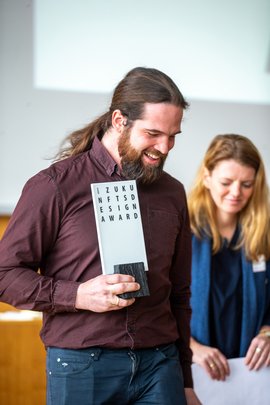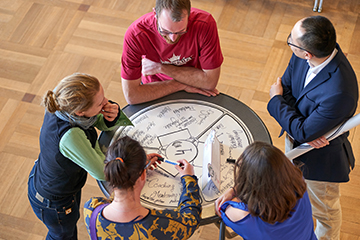
FutureDesign Innovation. Entrepreneurship. Design.
In a Nutshell
Designing the Future

The history of humanity is a history of progress. But progress requires courage and ideas. Every innovative approach, as outlandish as it may sound initially, has the potential to change the world as we know it forever. But new ideas are often met with rejection or dismissiveness. Small and medium-sized businesses often do not have the time in their busy everyday schedules to study strategic issues. But this leads to the risk of being swept away by disruptive changes.
Technological, social, and organizational achievements are mostly affordable today and often available in real-time. Networking defines our everyday life and our mental development. How can we systematically tackle changes, uncertainty, and complexity? Innovation research provides a few pointers. It shows that new possibilities lie at the interface of scientific disciplines and can only be developed in collaborative cooperation.
This is exactly what Germany’s only Master's program FutureDesign Innovation. Entrepreneurship. Design. sets out to do. In a unique inter- and trans-disciplinary setting, students from different areas work on their own ideas and the project topics of regional companies and institutions. The goal is to open the mind of students for new ideas, transfer what they have learned to their professional environment, and support regional development. The contents of the academic program are accordingly diverse. They range from innovation technologies and ethical questions to aspects of project group dynamics and their communication structures.
The Master's program in FutureDesign Innovation. Entrepreneurship. Design. arose in cooperation with the Innovations-Zentrum Region Kronach e.V.
Open. Innovative. Doing.

Changes can occur in unexpected ways -- sometimes rapidly, permanently turning our lives upside down. Designing change and the future means questioning traditions and overcoming boundaries. We open up space for thinking together by promoting a culture of listening, mutual respect, and self-organization. Failure is a necessary part of overcoming obstacles. The focus should be on the experiences that were gained. Experiences cannot be taught; they have to be earned.
Profile
The project-based Master's program FutureDesign Innovation. Entrepreneurship. Design. at Coburg University brings together students from different professions who have different scientific knowledge and experience. Many perspectives come together here - the conscious confrontation with opposing positions and contradictions delivers impulses for new ways of thinking.
The goal of the academic program is to develop individual skills. The goal is a combination of theoretical know-how and practical transfer in the form of project work. Coaches, as companions of the project groups, support reflection on the learned content, provide needed input, and thus ensure a dynamic atmosphere for learning.
The Master's program is supported by a wide network of organizations and businesses that want to establish Upper Franconia as a strong region for investment. Our practical partners include (selection):
- Innovations-Zentrum Region Kronach e.V. (IZK)
- District of Kronach
- District Coburg
- Technologieallianz Oberfranken (TAO)
- Coburger Designforum Oberfranken e.V.
- Bayern Innovativ GmbH
- Kronach Creativ e.V.
- IHK at Coburg
- IHK for Upper Franconia Bayreuth
Target Group
The Master's program is directed at university graduates in all disciplines. The applicant’s intrinsic motivation and attitude, rather than their profession, is the decisive factor. The Master's program FutureDesign Innovation. Entrepreneurship. Design. is aimed at people who are ready to change perspective and like to challenge the status quo. It targets movers and shakers with curiosity and the drive to kick off innovation processes, develop business ideas, and generate social utility. Students work on the solutions for the future in creative teams.
Master's Concept
The academic program FutureDesign Innovation. Entrepreneurship. Design. pursues an integrated method and first connects the topics of innovation, entrepreneurship, and design. In order to develop decision-making skills in the field of dynamic developments, we primarily study aspects of individual attitude, fundamental assumptions, and awareness-building. We also examine the decision-making processes of individuals and organizations.
Electives promote an individualized and need-based extension of the technical expertise already available. The program is completed with the Master's thesis.
Curriculum and Examination Regulations
The [study and examination regulations]* form the legal basis for the study program. The [module manual]* provides information about the content of the individual modules in the program.
*only available in german at the moment
Innovative Teaching Concept
The academic program boasts a unique teaching concept that serves as a model for future higher education instruction. The goal is to open the minds of students to new things, to teach them how to deal with uncertainty (so-called VUCA thinking) and how to bring what was learned to the businesses involved, thus strengthening the future potential of the region.
The academic program breaks through the traditional hierarchy between professors and students. Teachers guide the students through projects as coaches and the curriculum is oriented on the situational needs of the students. The focus is always on the sustainable transfer of skills. Our motto is "learning by doing".
The central teaching vehicle of the Master's program FutureDesign Innovation. Entrepreneurship. Design. is the semester projects: At the start of each semester, students and cooperation partners present their project ideas, a few of which are selected for further development. The required know-how is conveyed in five different teaching formats:
- CLASSIC: Classic lecture format for all students, independent of the individual project contents of the semester project groups. Teachers convey the contents of the different modules on a rolling basis with respect to individual attendance dates.
- COMPETENCE TRANSFER: Since the student groups are composed of different disciplines, the students can transfer their specific knowledge to their peers through presentations and digital transformation. The primary goal is to network and develop the personal profile of the students in the academic program.
- TWILIGHT CITIZENS: The teachers of the academic program introduce materials into the semester project groups "on-demand." They design their teaching materials, concepts, and methods dynamically and based on students’ needs, both in terms of content and schedule,
- TWILIGHT ALIENS: In addition, if needed, external experts are invited to teach the project groups the requisite know-how "on-demand".
- COACHING: Every student project is supervised by a teacher acting as a coach. S/he observes, provides feedback, and ensures that students receive the knowledge that they need to get ahead in their project.
The unusual teaching concept of the Master's program unifies the following basic orientations:
- Partnering to develop a regional strategy for meeting innovation demands
- Promoting a pro-entrepreneurship attitude
- Forward-looking and innovation-oriented skill development and change management
Structure of the Program
The Master's program is designed as a part-time professional program. The semester includes three multi-day block courses (kick-off, triple, and final), which each take place from Thursday to Saturday. In addition, there are four ‘twin’ meetings (Friday afternoon and Saturday) every two weeks. Students work on and organize projects themselves for the most part. For these in-class phases, the students meet primarily in Kronach, but also on-site at institutions and businesses if necessary.
Application and Admission Requirements
The prerequisite is an undergraduate university degree (Bachelor, Diplom, Magister). Due to the project-oriented focus of the program, professional experience is desired, but not a prerequisite. It is recommended that prospective students come to an informational and advisory meeting at the university before admission into the program. The goal is to clarify the special structure, electives, and procedures of the program.
Application
Read all the important information about application, e.g. evaluating your school-leaving certificates and learning German in order to start a master program at the University of Coburg.
Since the program is taught in German, you also have to prove your knowledge in German before the start of studies (level C1/C2).
